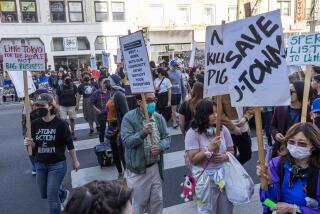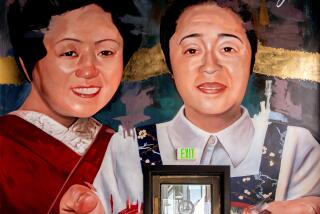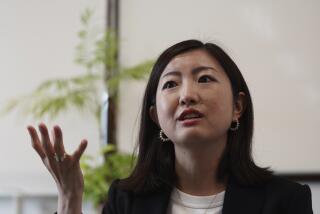2 Ex-Shuwa Employees Sue, Claim Beatings and Abuse
- Share via
Two former employees of Shuwa Investments Corp., the huge Los Angeles-based real estate unit of Shuwa Corp. of Japan, have filed lawsuits accusing executives of beating them, verbally abusing them and sexually harassing one.
In a suit filed in Superior Court last week and amended Wednesday, accountant Hajime Tanioka alleged that he was “repeatedly assaulted and battered” by Shuwa Investments Executive Vice President Takeshi Shiratori and President Takaji Kobayashi, the son of the founder of the firm’s Tokyo-based parent.
The suit alleges that the attacks were not isolated and that Kobayashi struck several other employees.
“I don’t think (Tanioka) considers it normal business behavior for a Japanese corporation,” said his lawyer, J. Patrick Maginnis.
Over a three-day period in December, 1987, the suit alleges, Kobayashi struck Tanioka with a telephone and calculator, punched him in the stomach and threw a set of keys at him when Kobayashi learned that the accountant had been seeing a former employee.
Sexual Assault Claimed
In the spring of 1988, Kobayashi struck Tanioka on the head with a book while the accountant was recovering from an eye injury sustained in an auto accident, according to the suit. Maginnis added that the incident occurred after Tanioka refused to work overtime.
Shiratori hit Tanioka with a ruler and with rolled up newspapers and magazines, the suit added. Tanioka, who took the job with Shuwa in 1987, has left the firm but remains in Los Angeles, his lawyer said.
In a second suit filed in Superior Court late last year and amended in June, former secretary Dawn Marie Stover alleged that she was “repeatedly sexually assaulted . . . battered and sexually harassed” by Kiichiro Kobayashi, the firm’s vice president and Takaji Kobayashi’s cousin.
According to the suit, Kiichiro Kobayashi fondled Stover, made sexual suggestions and ogled her. At other times, Kiichiro Kobayashi hit, slapped, pinched and struck Stover with rulers and other objects, the suit said.
In September, 1988, Stover quit and filed a criminal complaint accusing Kiichiro Kobayashi of assault and battery but withdrew it after Shiratori persuaded her to return to work. A month later, she quit again, but no further criminal complaint has been filed.
Has No Comment
In a response to Stover’s suit, Kiichiro Kobayashi denied the allegations and accused Stover in turn of beating him and berating him with derogatory and racist epithets.
Craig B. Jorgensen, a lawyer for Shuwa Investments, said he had not seen the Tanioka suit, but added: “We expect to deny the charges and defend it vigorously.”
He added that the company is in the process of filing an answer to the Stover suit denying the charges.
Takaji Kobayashi, speaking through his secretary, declined to comment on the suits. Neither Kiichiro Kobayashi nor Shiratori returned repeated telephone calls.
Both suits seek unspecified damages.
Observers said that corporal punishment is not common in Japanese businesses. “I would think it would be very unusual,” said Richard Drobnick, director of the International Business Education and Research Program at USC.
“It’s just not the way Japanese business people would operate in normal practice. . . . There’s a sense of order; everyone knows what to expect from the other person,” he said. “And there’s all kinds of signals that are given that you’re not performing up to expectations, but those signals would not commonly include hitting people.”
Shuwa Investments has made a name for itself by buying large commercial properties across the country, most notably the Arco Towers in downtown Los Angeles in 1987.
Shuwa bested nine bidders by agreeing to pay $620 million for the property, a near-record price for a single commercial property.
Shuwa also grabbed headlines in recent years by buying the ABC Building in New York and the former U.S. News & World Report headquarters in Washington.
More to Read
Inside the business of entertainment
The Wide Shot brings you news, analysis and insights on everything from streaming wars to production — and what it all means for the future.
You may occasionally receive promotional content from the Los Angeles Times.










